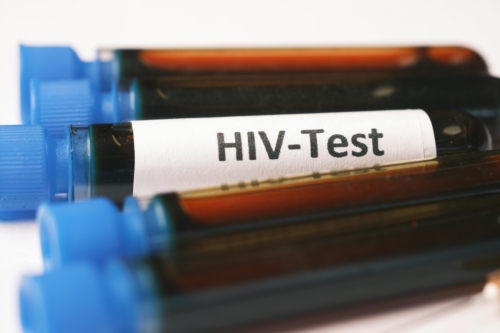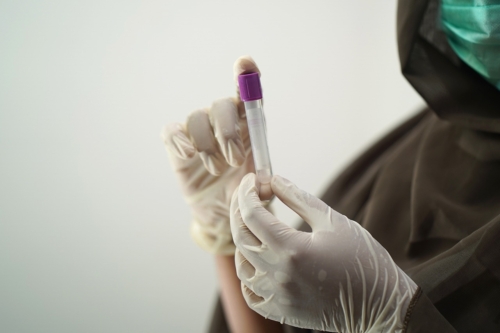
A woman in Navarre acquitted after being asked to serve 10 years for infecting her boyfriend with HIV
The Provincial Court considers it proven that the man knew of the woman’s pathology and that he “assumed and consented” to the risk situation.
The First Section of the Provincial Court of Navarre has acquitted a woman who was accused of having infected her partner with HIV after hiding from him that she was a carrier of this virus, the human immunodeficiency virus, which can cause AIDS. The woman was facing the 9 years in prison requested by the prosecutor and the 10.5 years requested by the private prosecution for a crime of aggravated injury, but the court concludes that the man did know of his partner’s pathology and that he “assumed and consented” to the dangerous situation.
The defendant has been a carrier of the HIV virus since 1987, as stated in the proven facts of the ruling. She and the complainant, who has a history of drug use, were a couple between 2015 and 2017, during which time they had sexual relations without taking measures to avoid transmitting the virus. In 2018, after the relationship ended, the man was diagnosed as a carrier of HIV, something that obliges him to undergo lifelong treatment.
The court finds that the complainant was infected by the defendant. The question in the case, therefore, was whether the man knew, during the relationship, that his partner was HIV-positive. He maintained that he was unaware of it, that he never told her, a thesis supported by the prosecution. The woman, on the contrary, claimed that she told him, that he knew about the medication she was taking and that she even accompanied him to the hospital for various consultations.
The court, after analysing all the evidence and the testimonies of those involved and witnesses, concludes that “she did not hide it” and that the complainant knew about the woman’s pathology, something that was “vox populi” in the place where they lived. The sentence adds that the actions of the accused, defended by the lawyer María Gracia Iribarren, were not intentional, not even as eventual malice (knowing that if an act is carried out there may be a result, and even so continue), as “she did not subject her partner to risky sexual relations” nor did she hide her illness. “The complainant assumed and consented to the situation of danger created by the woman, the contagion being the result of that risk, with knowledge of the consequences of that risk,” the judges emphasised.
Absuelta en Navarra una mujer a la que pedían 10 años por contagiar VIH a su novio
La Audiencia Provincial considera probado que el hombre conocía la patología de la mujer y que “asumió y consintió” la situación de riesgo.
La Sección Primera de la Audiencia Provincial de Navarra ha absuelto a una mujer a la que acusaban de haber contagiado el VIH a su pareja tras ocultarle que era portadora de este virus, el de la inmunodeficiencia humana y que puede causar la enfermedad del SIDA. La mujer se enfrentaba a los 9 años de prisión que solicitaba la fiscal y los 10,5 que pedía la acusación particular por un delito de lesiones agravadas, pero el tribunal concluye que el hombre sí conocía la patología de su pareja y que “asumió y consintió” esa situación de peligro.
La procesada es portadora del virus VIH desde 1987, tal y como consta en los hechos probados del fallo. Ella y el denunciante, con antecedentes de consumo de tóxicos, fueron pareja entre 2015 y 2017, tiempo en el que mantuvieron relaciones sexuales sin tomar medidas para evitar la transmisión del virus. En 2018, una vez terminada la relación, el hombre fue diagnosticado como portador del VIH, algo que le obliga a llevar tratamiento de por vida.
El tribunal ve acreditado que el denunciante se contagió por la acusada. La duda del caso, por tanto, estaba en dilucidar si el hombre sabía, durante la relación, que su pareja era portadora del VIH. Él mantenía que lo ignoraba, que nunca se lo dijo, tesis que sostenía la Fiscalía. La mujer, al contrario, aseguraba que se lo comunicó, que él conocía la medicación que tomaba y que incluso le acompañó al hospital a diversas consultas.
El tribunal, una vez analizada toda la prueba y testimonios de implicados y testigos, concluye que “no lo ocultó” y que el denunciante conocía la patología de la mujer, algo que era “vox populi” en el lugar donde vivían. La sentencia añade que la actuación de la acusada, defendida por la abogada María Gracia Iribarren, no fue intencionada, ni siquiera como dolo eventual (saber que si se realiza un acto puede haber un resultado, y aun así continuar), ya que “no sometió a su pareja para mantener relaciones sexuales de riesgo” ni ocultó su enfermedad. “El denunciante asumió y consintió la situación de peligro creada por la mujer, siendo el contagio el resultado de dicho riesgo, con conocimiento de las consecuencias de dicho riesgo”, destacan los magistrados.




